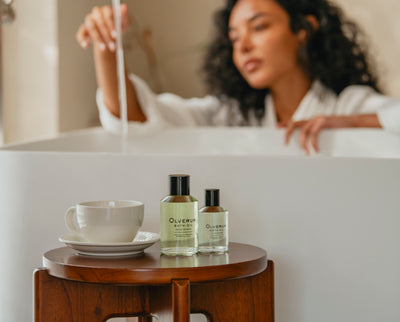Essential Oils: The delicate powerhouse of relaxing scent

Pinch your nose and do a taste test.
Vanilla…or chocolate…or anything else that is clearly identifiable…what is interesting is you cannot detect the individual flavour. This simple childhood experiment, often used as a way to overcome an unpleasant tasting medicine; reveals the true power of our sense of smell.
In today’s modern world, our primal needs are met more by sight than scent, so this supremely powerful sense becomes under-used and taken for granted and yet, it is one of the most formative, powerful and influential that we have, especially in the pursuit of balance, biological harmony and achieving a state of deep relaxation. in fact, it is our scent receptors that recognise flavours, give us pleasure and control some key biological responses. Indeed, a foetus is believed to start developing taste preference in the womb, due to building a library of scent and taste from the amniotic fluid.
Scent can help create a mindset. Scent can help determine a mood. Scent can help centre your focus, calm your thoughts and energise your body.
Understanding and exploring the extraordinary power of scent, the visceral reaction that it creates; is the science of Aromacology, dedicated to researching connections between scent and its ability to provoke particular reactions through stimulation of the Limbic System within the brain.
“Scentral” Command Centre:
The Limbic System is the emotional engine of our brain. A series of responsive structural pathways, including the amygdala and hippocampus which are responsible for forming emotional responses and locking in memories.
This area of the brain structure also helps control heart rate, blood pressure, breathing, hormone balance and stress levels. Our olfactory system, the core of scent recognition and response; is located within the Limbic System, which explains why aromas trigger such powerful memory recall and emotional response.
The olfactory bulb is located at the front of the brain, the area that is the body’s central command and determines reactive brain chemistry, our fight or flight, our sensory biological responses. As scent travels along the nose to the olfactory bulb, it passes across cells with tiny hair-like receptors each with unique scent memory. When a recognised aroma is identified, it triggers a lock and key in the memory.
Plant Power
Essential oils have been used throughout history, they transcend race and religion, crossing cultures throughout centuries of use. Essential oils are the unique character and core essence of their botanical origin. They retain the natural flavour, scent and benefit of the source. They are actually compounds, rather than specifically oils; that are obtained through either steam distillation, cold pressing or the ancient art of enfleurage; where the aroma of a flower is captured through using fat to dissolve and absorb the scent.
These compounds are highly volatile and therefore evaporate to gas very quickly, enabling them to be inhaled for optimal speed of impact and absorption into the biological process, a powerful conduit to wellbeing.
The Science of Nature
Clinical research is ongoing as essential oils continue to gain increasing interest from within the medical community as inhalation indicates different responses and activations within biochemistry. Early, mounting research in recent years is demonstrating evidence of certain pharmalogical responses that may be particularly useful in the formation of treatments for certain conditions, especially within mental health.
Stress and anxiety is a part of modern life. Our fears over the future, the state of the world, the health and wellbeing of loved-ones, financial security and perceived success, dominate our thoughts, it is understandable, the world is often a turbulent place. This state of heightened anxiety and stress, is a well-documented, researched and understood key contributor to biological imbalance to our mental wellbeing.
Essential oils are been more thoroughly researched and practiced to demonstrate their power in helping suppress the release of feelings of stress, negativity and anxiety and promote clarity, calm and stability which helps promote and support neurogenesis (mental agility, cognitive function). Increasing understanding of how scent controls our reactions to certain situations, helps with professional performance, educational assessment and interpersonal relationships.
Making Scents of it
Using essential oils and aromatherapy to support your wellbeing is about empowerment.
Surrounding yourself with scents that channel positivity, focus, clarity and calm instills the control of your environment and the triggers to mental health.
Essential oils can support you in so many areas of daily life when inhaled or topically applied. From the simplicity of creating a space for your home to uplift your mood with fresh, enlivening citrus oils to the herbaceous notes of lavender, clary sage, hops, chamomile to soothe your racing thoughts to a more tranquil state of mind, ready for restorative sleep, which builds an optimal environment for reducing stress, inflammatory reactivity and boosting reparative function in the body leaving you healthier and more resilient. The power of these oils can also help focus your mind for improved productivity, ease unsettled stomachs, nausea, headaches and help balance perspective from anxious thoughts.
Creating a calm state of mind through rhythmic, measured breathing is not as easy as one might believe. To activate the PNS or parasympathetic nervous system, you must regulate each breath, slow the heart rate and attempt to replicate a state of relaxation similar to falling asleep.
Entering this state is extremely beneficial to wellbeing as the body can work in harmony. To achieve this deep relaxation, try these simple inhalation techniques:
Step 1: Inhale and count to 4
Step 2: Exhale and count to 6
Step 3: Repeat Steps 1 and 2 up to 10 breaths
https://onlinelibrary.wiley.com/doi/full/10.1002/ptr.6854: Effects of essential oils on central nervous system: Focus on mental health
Essential oils and 'aromatherapy': their modern role in healing - https://pubmed.ncbi.nlm.nih.gov/9519666/
Stress affects neural activity: https://www.mdpi.com/1420-3049/26/9/2571/htm#B6-molecules-26-02571





